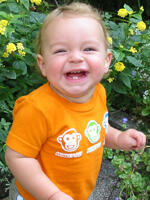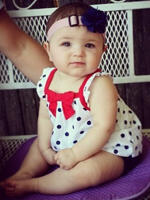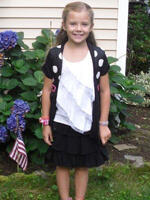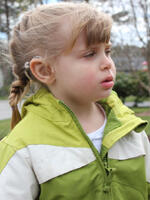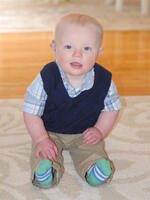Henry's story
By Richard Wentworth
In June of 2007 my son Henry had his hearing screened shortly after he was born. I remember the sinking feeling I felt when the screener told my wife and me that neither of Henry’s ears passed. We were told that the screen is not a perfect test, but that Henry should be seen by an audiologist. Weeks later at Henry’s audiology appointment, we learned that Henry had a hearing loss. It was difficult, both practically and emotionally, to put this into perspective. During this confusing time, we received a call from a parent outreach specialist at the Massachusetts Department of Public Health, Universal Newborn Hearing Screening Program, to discuss Henry’s diagnosis and the intervention services that we could get for him. The outreach specialist helped us to identify and organize the next steps in our plan for Henry’s care. In addition, talking with another parent of a child with hearing loss helped us realize we weren’t the only ones going through this, and bolstered our confidence that we could be strong enough to give Henry a good start and a good life.
Dorothy’s Story
By the Weems-Sheppard Family
"Dorothy’s Congenital Cytomegalovirus results came back positive.” That single sentence changed my entire outlook on motherhood and what it meant to raise a child.
I had a totally and unequivocally normal pregnancy. A touch of morning sickness in my first trimester was nothing compared to the Mono-like symptoms a Congenital Cytomegalovirus (cCMV) positive pregnancy typically brings. At 35 weeks gestation, my water spontaneously broke and I gave birth a few short hours later to a healthy, albeit small, baby girl that we named Dorothy.
Because of her early birth and Apnea of Prematurity, we stayed the Special Care Nursery (SCN) for 14 days. While there, Dotty’s hearing test results showed an unresponsive left ear and we were referred out for further testing. Because of the hearing loss, her SCN doctor recommended testing her cCMV. We were assured that this virus was very rare and because Dorothy did not have the other symptoms of cCMV, it was extremely unlikely that she would test positive. It was only later that we learned how extremely common CMV was — more common than Down Syndrome, Spina Bifida, and Fetal Alcohol Syndrome.
The days passed and Dorothy grew strong enough to be discharged. The results for the cCMV test, however, were never passed along to us. It took three weeks before our pediatrician tracked down the results. She called with the news; “Dorothy’s cCMV results came back positive.”
Our Early Intervention team was at the house when I got the call and the one piece of advice I was given was “Do NOT Google ‘cCMV’.” I, of course, did not heed any of their advice and I dove head first into research about cCMV and came out the other end terrified of the prognosis. Children born with cCMV could have liver problems, lung problems, seizures, progressive hearing loss, mental disability, cerebral palsy, and progressive vision loss.
I felt like I was hit by an eighteen wheeler. We hit the ground running, though, and started seeing an Infectious Disease doctor at Boston Children’s Hospital who prescribed a seven month course of a powerful antiviral medication that would help Dorothy’s body combat the virus and hopefully stop the progression of her hearing loss.
Fortunately, Dorothy’s MRI showed no brain damage as a result of cCMV. However, as we get close to her first birthday, her hearing in her left ear has been almost totally destroyed due to the virus and her hearing in her right ear is unstable. She wears a Bone Anchored Hearing Aid (BAHA) on a head-band to provide her auditory access to her environment and we use American Sign Language in the home and out in the community to ensure she isn’t missing any language opportunities.
I never imagined that my child’s life would be impacted in this way, by a common virus that I had never heard of, but with the help and support of the multitude of agencies surrounding our family, Dorothy’s life will be full and she will have many success stories to share in the future.
Mira’s Story
By Leah F.
My daughter, Mira, who is now 9 years old, was diagnosed with a sensorineural hearing loss at 3 weeks of age. I remember the day vividly. She had failed the newborn hearing screening when she was born. They had told me this was normal and that there was a lot of fluid. When we returned for follow up she failed again and I was told she needed an ABR. There was not a thought in my mind that something was wrong.
At the ABR a couple of weeks later it was then that we received news I never had even thought of. Starving my newborn baby in the early morning hours to bring her to a test in a hospital where she needed to be still and sleeping I watched as they brought us into a very quiet sound proof room with a small crib and wires. I watched as they put little tubes into my daughters’ ears attached to a computer and the sensor pads on her head.
After a couple hours of testing I was asked if my husband was close and could I have him come for the results. This is when I knew something was wrong. I called my husband and when the Audiologist went through the results, all I heard was that my baby was deaf and I started to cry and wondered what did I do wrong.
Hours after the diagnosis I called the Audiologist back to fully understand what I was told. She repeated to me with empathy and feelings that my daughter had a moderate to severe hearing loss in her left ear and a severe hearing loss in her right ear. My baby was deaf and in need of hearing aids. What an emotional roller coaster ride, which has lead to an amazing journey and world that I never dreamed was possible.
Mira wore hearing aids from practically birth until the age of 3 when we had finally decided that a cochlear implant was our next path. At the age of 3 and after numerous paperwork and meetings with ENTs, Audiologists, and Psychologists we had decided that we would have Mira undergo surgery in August 2007 on her right ear which was profoundly deaf. It was heartbreaking to have my daughter in a hospital bed (as it is with any parent) to be told they would give her "laughing" juice and to only watch her lose control and function of her body and almost look drunk. They wheeled her down the hall. When she returned with the surgery successful she awoke to a large bandage over her ear. The journey had begun.
Over the next few months we were activated, but what was in store next we didn't realize, we had to find the right Speech Therapist to assist with teaching Mira how to "learn to listen", "listen to read" and "read to learn". The process was overwhelming at times but we pushed through knowing the decision we made for our daughter and family was the right one. We met strong and helpful people that guided us through our journey. They included Teachers of the Deaf, Audiologists, and Speech Therapists trained and specializing in children with hearing aids and cochlear implants.
At age 4 we decided that it was time that Mira had the surgery on her left ear so that she would have the utmost access to the world around her. At the same time, our school realized they could not service her properly and the search began for the right academic setting for Mira. When we reached Clarke Schools for Hearing and Speech we knew that she was going to get the best benefits of her new access to the world. This was crucial in Mira's learning path and a benefit to everyone.
Now at the age of 9 and fully mainstreamed into our hometown school district, with a TOD (Teacher of the Deaf) from Clarke and a full functioning FM system with pass around microphone for group work, Mira learns and thrives. She is making hometown friends and she enjoys reading and dancing. Her dance studio even uses the FM to further the passion she has.
The journey is long and continuing. My daughter is deaf and proud but through technology we have been able to give her the gift to access sound, when she chooses. We are blessed as a family and continue to learn every day more about life.
Sarah, Can You Hear Me?
By Donna V.
Once upon a time there was a family of four — a mother, a father, and two children ages 10 and 4.
The oldest child, Ashley, had exceeded childhood milestones in many ways — walked at 9 months, ran at 12 months, climbed jungle gyms like a monkey at 18 months, spoke in full sentences by the age of 18-19 months, and rode a bike without training wheels at 35 months.
It became apparent the youngest child, Sarah, was very different. She appeared to be "delayed" compared to the first daughter. Sarah crawled at 10-12 months and walked at 18 months but could not walk more than two or three steps without falling. She often bumped her head when she fell. Although she was talking and expressing herself with a few select single words, the connected speech and audibility of those words were not clear.
She received speech therapy through early intervention for a while but then Sarah's parents were told at age 2 she didn't qualify for continued speech services because "testing" put her speech in the average range. Just before age 3, early intervention conducted their periodic assessment and asked "what happened to her speech?" and they started speech therapy two months before she aged out of early intervention. The parents supplemented with private speech therapy.
Meanwhile, over a period of one year, Sarah had three audiological assessments conducted by a world-renowned medical center. All assessments were inconclusive and incomplete. Sarah's frustration in trying to communicate with others was evident. She would throw "fits," cry, and lash out at people. Everyone who tried to communicate or work with Sarah was frustrated. Sarah's parents encouraged Sarah to "show" them what she wanted. This was working, to a degree, but Sarah's family needed answers. The owner of Sarah's speech therapy practice encouraged Sarah's parents to seek yet another audiological exam at Children's Hospital in Lexington. By now, Sarah had just turned 4 years old.
I think you can guess where this story is heading. On the first visit to Children's Hospital, Sarah was diagnosed with bilateral sensorineural moderate to severe hearing loss. Given her diagnosis and the severity of her hearing loss her two speech therapists as well as her parents were shocked given the "advancement" of her speech. Although people could not comprehend Sarah's connected speech 80% to 90% of the time, she had enough speech that did not support that level of hearing loss. As Sarah had passed her newborn hearing screening, her parents, and the medical professionals, needed even more answers.
Sarah was now under the care of Children's Hospital Deaf and Hard of Hearing department located in Waltham. Children's Hospital "fast tracked" Sarah through multiple levels of medical care given her late diagnosis. The first step was to obtain hearing aids for Sarah. Many factors contribute to why people have hearing loss but the hearing loss technology available today helps people lead a productive and quality life.
Let's fast forward to Sarah's diagnosis of Enlarged Vestibular Aqueduct Syndrome (EVA). A devastating (for at least her parents), life-long unstable condition that's inoperable. This condition causes coordination problems, any bumps to the head could cause additional hearing loss and could progress to profound deafness, Ah, ha — "bumps to the head" — that was the key. Remember? Sarah was falling and bumping her head all the time.
Her parents were told Sarah should never participate in any contact sports for the rest of her life. This includes games such as kick ball in gym class, playing basketball at recess, climbing rock walls, avoiding monkey bars in the playground, etc. Anyone have bubble wrap for a very active 4-year old who absolutely loved to do all those things and more? After seeking consultation with Sarah's new Ear, Nose and Throat (ENT) specialist, Sarah's parents decided to take one day at a time and evaluate each situation as it presented itself. Sarah and her sister Ashley are learning sign language through a DVD program with support from their mother who had learned sign-language years ago (who is also trying to teach Sarah's father) all in preparation for the future. However, if Sarah were to go deaf, she would be eligible for a Cochlear Implant.
I am pleased to report that Sarah, my daughter, is doing great! She loves wearing her hearing aids, which she's had for six months, and doesn't like to be without them, even for a couple of minutes. With her hearing aids and continued speech therapy she is progressing and is a pure joy to listen to. As a matter-of-fact, we can't keep her quiet and she continues to hear new sounds for the first time! Her frustrations have significantly decreased and her behavior has significantly improved. She has a great sense of humor and has a never ending smile that will brighten your day. She has many hurdles ahead of her but with the support of family, friends, her audiologists, and Children's Hospital the hope is that she will progress nicely in the years to come.
If you, or someone you love, is having trouble hearing, please seek the guidance of an audiologist or other medical professional. Your ears depend on it!! An actor once said:
"You should HEAR what you're missing."
Little Moments
By Courtney Aseltine
One of the questions I’m most commonly asked about Connor’s hearing loss is this: “How did you know? He’s so little.” And it’s an understandable question. Obviously a newborn baby can’t tell you that something’s wrong, and even if he could, he doesn’t know what the world is “supposed” to sound like. How could he tell you something isn’t right? When people ask me this question I always give praise to the newborn hearing screen. Just 25 years ago less than 3% of newborns were screened before leaving the hospital, as opposed to the nearly 98% screened today.
Connor’s first two weeks of life weren’t easy ones. He was born with bilateral pneumothoracies (holes in his lungs) and severely low platelets that left him in the NICU for two weeks. After 15 platelets transfusions, multiple IVIG infusions, and two surgeries, he was finally ready to come home. When he referred (a fancy term they use instead of “failed”) his newborn hearing screen the day of his discharge from the hospital, I didn’t know what to think. Initially I went into panic mode, thinking the worst (my natural reaction) but everyone assured me he would be fine. I was told it’s normal for newborns to refer, mostly due to fluid in their ears. We left the hospital with Connor that day, making a follow-up for him to be re-screened in a week. After failing his screen the second time, we returned the following day for more extensive testing. That was the day everything changed.
I could go on and on about the waves of emotion I felt that day, and in the days following. But instead I’ve decided to share with you the letter that I recently wrote to Connor on the day he turned 9 months old, because as you’ll see, so much has changed.
Dear Connor,
I still remember the day like it was yesterday. Daddy and I sat in the small, dark room, you on my lap, Daddy sitting anxiously next to us. “Don’t worry”, everyone told us. “It’ll be fine”, they said. But by the silence in the room and the look on the audiologist’s face, I knew something was wrong. The audiologist tested your left ear first. “He has a profound loss,” she said. She continued talking; something about testing the right ear, but I couldn’t hear the words coming out of her mouth. My little baby, only three weeks old, who had already endured more than one should in life, was deaf in his left ear. Tears filled my eyes while you slept innocently in my lap and the testing continued. “Good news,” she told us. “He has some hearing in this ear.” Some? Why not all? How is this good news? These thoughts and so many more filled my head. I tried to fight back the tears, but they came on full-force. So many questions ran through my mind as the life I had imagined for you slowly faded away. I tried to hear what the audiologist was saying. There was talk of hearing aids, cochlear implants, early intervention, and FM systems, but all I could think about was if my baby would ever be able to hear my voice. I remember leaving the hospital that day and crying the whole way home. If only I knew then what I know now. Of course I would have been sad, but I also would have been filled with an incredible amount of hope. So often we look at a disability and see what someone is not able to do, but it isn’t often that we focus on the opposite. Everyday you inspire me. You wake up with a smile on your face and you are so in awe of the world around you. You work so hard, and at 9 months old you are right on track with your peers. You have found your voice and you certainly found what remains of your hearing. I do know that journey that we’re on won’t always be easy, but I also know that it will always be filled with love and support. You have brought so many wonderful people into our lives, and we thank you for that. So while I can’t sit here and say I never feel sad, I will say that I honestly wouldn’t change a thing. And as for that life I saw fading away? It’s back and brighter than ever. Shine on. You are amazing.
Love,
Mama
In the beginning I was convinced that Connor’s hearing loss was caused by his stay in the NICU, but now I realize I just wanted someone to blame. Like if I knew someone else caused it, it would make it better. But that’s not the case. It turns out Connor has something called EVA (enlarged vestibular aqueducts). There’s lots I could tell you about EVA, but here’s what matters: it’s progressive. That means there’s a chance that Connor will lose the rest of his hearing, and it could happen any day. He could wake up hearing and it could be gone within hours. I try not to think about it and focus on helping him hear as much as he can, while he still can. He has wonderful therapists and we’ve found amazing support at a local program for Deaf/HH kids. Like I said in my letter, I’m not going to pretend I don’t ever feel sad. When I’m giving him a bath and I try talking to him, but he doesn’t even look because his aids are out. When I’m driving in the car and I’m singing to him, but he can’t hear me (no aids in the car, he tries to eat them). Or at night when he wakes up crying and I’m trying to comfort him, but I’m not sure he even hears what I’m saying. These are the moments I feel sad. But that’s all that they are. Moments. Small little pieces of a much larger, amazing life, one that I would never change.
